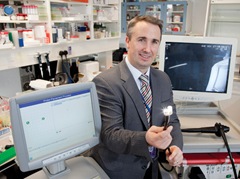Probing research: UCC lung cancer treatment invention
 Dr Declan Soden tells Stephen Dineen about an invention that could revolutionise lung cancer treatment.
Dr Declan Soden tells Stephen Dineen about an invention that could revolutionise lung cancer treatment.
An innovative device designed to provide endoscopic chemotherapy for those with lung cancer has been invented at the Cork Cancer Research Centre, and was joint winner of the University College Cork invention of the year award in April. It was invented by Declan Soden and John Hinchion.
The lung laparascopic electroporation electrode (LLEE) device allows cancerous cells to be specifically targeted by a short pulse of energy so that the treatment drug can be targeted at the cancerous cells and avoid healthy cells. The device, if successfully trialled, could mean treatment for lung cancer would be done endoscopically (keyhole surgery). Cells (healthy or cancerous) often absorb large chemotherapy poorly so localising absorption to the area targeted by the electrical pulse would be a significant advance.
Electroporation has been used for treating skin cancers in recent years in Ireland, and it was from the success of this that Declan Soden started working on similar approaches to gastrointestinal and colorectal cancer. This led to the invention of an endoscopic electroporation device for colorectal tumours, called EndoVe. This device is currently being clinically trialled and has generated clinical interest from surgeons interested in applying the same approach to pancreatic, liver and lung cancers. John Hinchion, cardiothoracic surgeon at Cork University Hospital, approached Soden about possible collaboration on a treatment for lung cancer. The device for lung cancer treatment is now being used on large animals to test for the safety of the system and Soden, General Manager of Cork Cancer Research Centre, hopes clinical trials with the new device will start in the middle of next year.
Benefits
For Soden, there are several reasons why developing an electro-chemotherapy device for lung cancer is a good reason. “I guess it makes a lot of sense to try and develop a system like this for lung cancer. Not a lot of research is done into lung cancer: if you have lung cancer it’s almost like it’s your own fault,” he says, pointing out that there are significantly more deaths from lung cancer than breast cancer or prostate cancer, “but yet we spend a lot more money on research for them than lung cancer. It’s probably a topic in its own right why there isn’t a whole lot of research done into lung cancer but I think lung cancer victims feel guilty, they feel it’s their own fault,” he says, adding that “there’s an increasing number of patients [of lung cancer] who will present who never smoked.”
 On the basis of how electro-chemotherapy might improve the treatment of those with colorectal cancer, there could be significant reductions in inconvenience and cost from the new LLEE device. Soden believes an out-patient endoscopic treatment with a follow-up six weeks later would cost “a couple of thousand euro” as opposed to a stay in hospital which could cost between €20-40,000. In the case of colorectal cancer patients, particularly those for whom the removal of a large part of the colon might involve complications, electro-chemotherapy would mean not having to spend time in intensive care, wearing a colostomy bag, the process of reversing the need for a bag or the subsequent rehabilitation. The EndoVe device is currently being modified with a view to treatment of stomach and esophageal cancers.
On the basis of how electro-chemotherapy might improve the treatment of those with colorectal cancer, there could be significant reductions in inconvenience and cost from the new LLEE device. Soden believes an out-patient endoscopic treatment with a follow-up six weeks later would cost “a couple of thousand euro” as opposed to a stay in hospital which could cost between €20-40,000. In the case of colorectal cancer patients, particularly those for whom the removal of a large part of the colon might involve complications, electro-chemotherapy would mean not having to spend time in intensive care, wearing a colostomy bag, the process of reversing the need for a bag or the subsequent rehabilitation. The EndoVe device is currently being modified with a view to treatment of stomach and esophageal cancers.
Soden says there is also the benefit of patients not being endangered by the possible long-term effects of chemotherapy, particularly among younger cancer patients. “There’s now also a growing amount of concern about chemotherapy regarding the longer term. For people who might have used it in their 20s or as teenagers, or even in their 30s, what happens is when they’re fifty or sixty they start to suffer serious consequences or side-effects from that exposure to chemotherapy,” he says, whereas the long term repercussions to those who receive chemotherapy later in life are less evident.
Gene therapy
Whilst electro-chemotherapy can shrink cancerous tumours there is still the danger that the cancer will return. With this in mind Soden and Hinchion are researching gene therapy. The concept, which is not mainstream, is about providing a way to help the immune system to recognise cancer cells and enable it to “mop up” the remaining cells. This could be done, they believe, by artificially transplanting a (human) gene that would normally be expressed in a healthy cell, into the cancer cells, forcing them to express themselves. The immune response could then be activated and cancer cells exposed to immune cells. They have been working on a project funded by the Health Research Board over the past two years that was successful in testing on mice. Where traditional treatment has meant the shrinking of cancerous tumors, this will, if successful, result in vaccination against certain cancers.
Clinical trials will require money and a sufficient level of interest. “What we have right now,” says Soden, “is a drug to shrink these tumors down very effectively. What we would like in time to do when we have the resources is be able to start a gene therapy trial where, not only would we be using the drug, but before that we would replace the drug with DNA, and get the DNA in there to get the immune system going and then at the appropriate time (it might be two weeks later, a month later) we would go in with the drug and shrink it.”
Economic benefits
Currently, state agencies fund research projects like Soden and Hinchion’s but the responsibility for the money lies with the university. They then patent any concept that is novel and either a start-up company from the university employs the technology to get funding to develop it, or the technology is licensed out to a medical device company for development. In time there is the possibility of a return on investment for the university.
At the award ceremony UCC President Dr Michael Murphy said: “The ability to commercialise Irish research projects and to bring them to a global market will be a vital contributor to the renewal and recovery of our economy.”
Soden also sees a possible benefit for the domestic economy: “If part of the investment occurred through Ireland, if the medical device companies are based in Ireland and you start doing the research through Ireland then there’s a lot of benefits: they’re doing the research and improving the technology further, they’re developing the system further, then that’s creating jobs here as well.”





